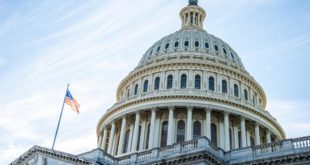America's famous Corn Belt should better be known as the nation's Subsidy Belt. Original Article: America's Corn Crop Comes from "Corny" Subsidies [embedded content] Tags: Featured,newsletter
Read More »Federal Student Loans Drive Up College Tuition Levels
Like every other government program designed to make something “more affordable,” the student loan program has managed to drive college tuition to atmospheric levels and saddle students with massive levels of debt. Original Article: Federal Student Loans Drive Up College Tuition Levels [embedded content] Tags:...
Read More »Let them Merge: Foreign Acquisition of US Steel
Nippon Steel's proposal to merge with US Steel is meeting opposition from the usual suspects in Washington, not to mention Tucker Carlson. Their hysteria is off the charts. Original Article: Let them Merge: Foreign Acquisition of US Steel [embedded content] Tags: Featured,newsletter
Read More »Tyler Cowen on the GOAT in Economics
Tyler Cowen is Holbert L. Harris Chair of Economics and chairman of the Mercatus Center at George Mason University. With Alex Tabarrok, he runs the popular economics blog Marginal Revolution. Tyler joins Bob to discuss his latest book. Tyler's New Book for Free: Mises.org/HAP428a Tyler's Blog: Mises.org/HAP428b Join Tom DiLorenzo, Joe Salerno, and Patrick Newman in Tampa on February 17: Mises.org/Tampa2024Use code "Action24" for 15% off admission. Human Action...
Read More »The Bad Deal That Was the New Deal: FDR’s Assault on Individual Rights
The New Deal’s War on the Bill of Rights: The Untold Story of FDR’s Concentration Camps, Censorship, and Mass Surveillanceby David T. BeitoIndependent Institute, 2023; x + 379 pp. Few if any readers of this column admire Franklin Roosevelt, but as the historian David Beito reminds us in this outstanding book, most of his professional colleagues rank Roosevelt among our greatest presidents, second only to Abraham Lincoln. Those who accord him this rank usually stress...
Read More »When Medical Authorities Went Totalitarian: Understanding Covid Policies and Protocols
Review: The New Abnormal: The Rise of the Biomedical Security State Senator Rand Paul mentions Aaron Kheriaty’s The New Abnormal: The Rise of the Biomedical State in his book Deception: The Great Covid Cover-Up. Dr. Kheriaty’s online biography includes the following information: Dr. Kheriaty is a plaintiff in the landmark free speech case Missouri v. Biden challenging government censorship on social media. . .. Dr. Kheriaty also serves in teaching and advisory roles...
Read More »A Message from Tom DiLorenzo: Help Us in Our Fight to Save Freedom in America
Please help us in our fight to save freedom in America—and indeed the rest of the world—by making as generous a donation as you can. I became a student of Austrian economics and libertarian philosophy by accident. In my first semester in college in 1972, I signed up for Principles of Microeconomics. In the classroom was a bookshelf that happened to have all the back issues of The Freeman published by the Foundation for Economic Education. I started reading some of...
Read More »2024 Predictions (and New Years Resolutions)
On the final Radio Rothbard of 2023, Ryan McMaken and Tho Bishop are joined by Patrick Newman. At a recent Mises event, Newman made some bold predictions about the Federal Reserve's actions in 2024, some of which already look to becoming true. The three talk about what may be on the table for the new year for the economy, politics, and foreign affairs. "Are We Headed for a Recession in 2024?" by Patrick Newman: Mises.org/RR_166_A Claim your free...
Read More »Why Secession Offers a Path to Wealth and Self-Determination
[This article is chapter 5 of Breaking Away: The Case for Secession, Radical Decentralization, and Smaller Polities. Now available at Amazon and in the Mises Store.] One of the most consistent and enthusiastic defenders of human rights and “natural rights” in the twentieth century was the economist and historian Murray Rothbard. A self-described libertarian, Rothbard would also have fit in well among the more radical liberals of the nineteenth century such as the...
Read More »The Problems with Post-Trump Populism
When Murray Rothbard established a realignment in libertarian thought, his standard was determined by sovereignty rather than bipartisanship. A right-wing populist platform might be the most popular campaign strategy in the last few years. Since Brexit, a trend has swept a wide range of the globe. The question remains what this political revolution should be called. If it were a daring step away from the establishment, spectators might be concerned as to why so many...
Read More » Swiss Economicblogs.org
Swiss Economicblogs.org




